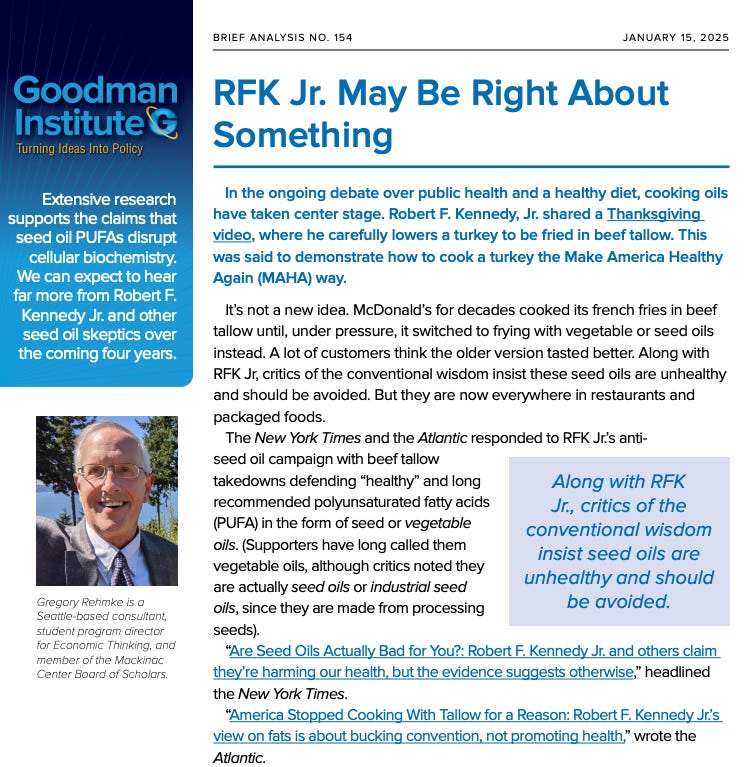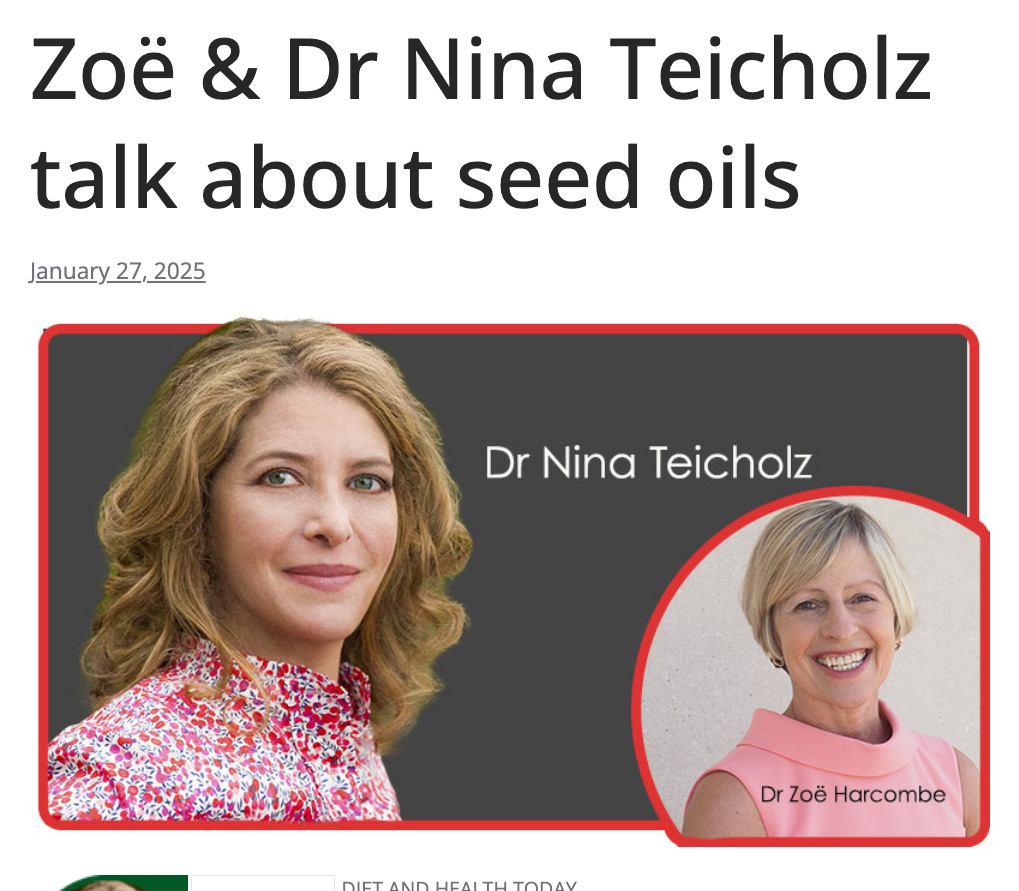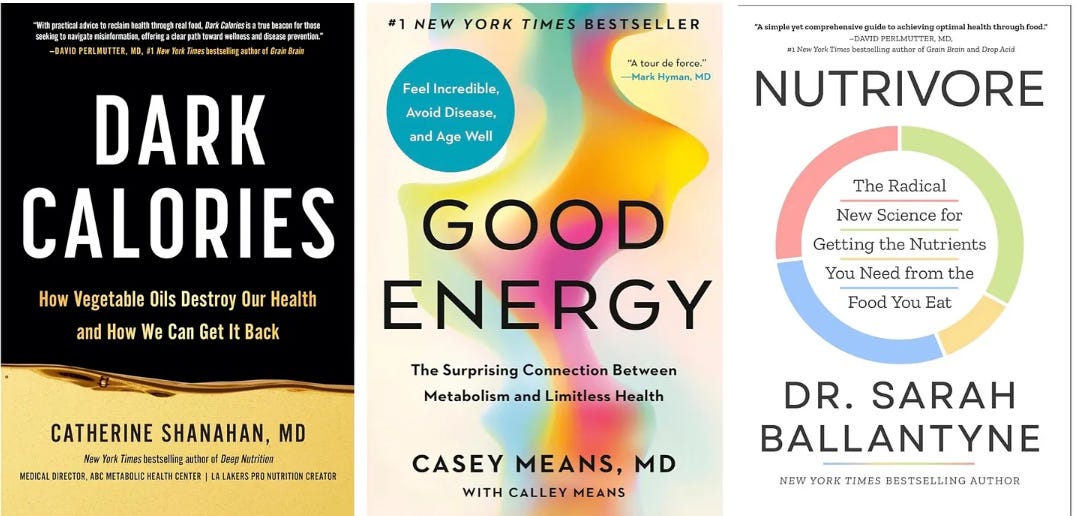RFK, Jr. May Be Right About Seed Oils
The Goodman Institute published my Brief Analysis on the cooking oil debate: RFK, Jr. May Be Right about Something (Jan 15, 2025). An earlier post looks at the debate, referencing many articles and books: Notes on the Seed Oils/Vegetable Oils Debate.
Research on seed oils (referred to as vegetable oils by supporters) can get complicated. Imagine we had funding for a seed oil experiment for homeschool debate tournaments. For ten tournaments, all provided meals and snacks would be seed oil free. So boiled eggs, beef sticks, and vegetables for snacks, but no seed oil chips, packaged foods, or seed oil mayo and sauces. Another ten tournaments could serve as control, with “normal” Costco giant muffins and packaged snacks (many mostly heathy meals served at tournaments).
Then the experiment could try to compare student outcomes at the tournaments, judging behavior and maybe quality of speech and debate competition. But even if measurable benefits were identified for the no-seed oil tournaments, how would we know this was due to being seed oil free? Seed oils are in nearly all highly processed foods (chips and other snacks), so maybe it’s the “ultra” processing that causes problems, not just the seed oils.
Or maybe it was more the excess carbohydrates in the processed foods. Ben Bickman discusses Is Your Diet Killing You? | Dr. Benjamin Bikman | EP 520.
In my Goodman Institute brief, I reference seed oil (vegetable oil) advocates who cite studies showing health benefits for people consuming more vegetable oils. But this can be due to “healthy user bias.” People who make the effort to cook with oils they believe are healthier likely have healthier lifestyles, perhaps exercising and getting outside more.
Deeps Dives into the Seed Oil Debate
A recent ZOE podcast: “Seed oils may lower your risk of heart disease" is discussed at link below, and begins:
Jonathan Wolf opened with “Seed oils are in everything. You'll recognize them as sunflower oil, soybean, or canola, that's rapeseed in the U.K. They're in our snacks, our restaurants, and our pantries. They're inexpensive, they have a neutral taste and a high smoke point which makes them great for frying… But many people think seed oils are evil. There are countless videos calling them toxic which have gone viral online.” Wolf said, we’re going to find out what the science says with Professor Sarah Berry.
Quote above from Zoe Harcombe article: ZOE & misinformation about seed oils. Dr. Harcombe first reviews the history of ZOE, a personal nutrition company, then reviews and responds to four issues the ZOE podcast claims to refute:
1) An association between intake in seed oils and health issues. 2) Seeds oils create an unfavourable omega-6 to omega-3 ratio and thus inflammation. 3) Seed oils are unnatural, refined and bleached etc. 4) Seed oils when they're heated are prone to oxidation. (source: ZOE & misinformation about seed oils)
And an earlier Zoe Harcombe podcast also discusses the ongoing healthy cooking oils debates: Zoë & Dr Nina Teicholz talk about seed oils
My Goodman Institute Brief Analysis concludes:
Extensive research supports the claims that seed oil PUFAs disrupt cellular biochemistry, especially mitochondrial function. Once used for industrial lubrication, seed oils were rebranded as less-expensive cooking oils.
Later, after the federal dietary guidelines were enacted, seed oils were advocated as healthy and became a key ingredient in highly processed foods. Their use allowed the food industry to reduce saturated fats, which, again, public health officials said caused cardiovascular disease.
Decades later public health advocates, nutritionists, and research scientists still disagree on which fats are healthy and which deadly. We can expect to hear far more from Robert F. Kennedy Jr. and other seed oil skeptics over the coming four years. [And then lists studies both for and against seed oils]
For Further Research
Three recent and recommended books: Dark Calories, Good Energy, and Nutrivore. Two opposed to seed oils, one in favor.





